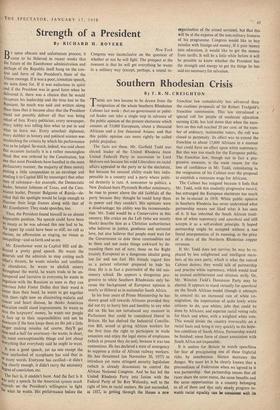Strength of a President
By RICHARD H. ROVERE ' BY some obscure and unfortunate process, it came to be believed in recent weeks that the future of the Eisenhower administration and perhaps of the Republic itself hung on the con- tent and form of the President's State of the Union message. If it was a poor, irresolute speech, we were done for. If it was audacious in spirit and if the President was in good form when he delivered it, there was a chance that he would recapture his leadership and the time lost to the Russians. So much was said and written along these lines that it became clear that the President could not possibly deliver all that was being asked of him. Every politician, every newspaper, every lobby was telling him what to put in and What to leave out. Every armchair diplomat, every dabbler in history and political science was establishing the criteria by which his performance Was to be judged. So much, indeed, was said about this occasion (actually it is a rather meaningless ritual that was ordered by the Constitution, but one that most Presidents have handled in the most Perfunctory manner, the majority of them merely Putting a little composition in an envelope and sending it to Capitol Hill by messenger) that other men of substance—for example, the Democratic leader, Senator Johnson of Texas, and the Com- munist leader, Premier Bulganin of Russia—de- cided that the spotlight would be large enough to illumine their large frames along with that of Mr. Eisenhower. They made speeches, too.
Thus, the President found himself in an almost impossible position. No speech could have been as meaty as he was advised this one had to be. NO upper lip could have been as stiff, no call as Clarion, no affirmation as ringing, no vision as compelling—and so forth and so on.
Mr. Eisenhower went to Capitol Hill and de- livered a pretty good speech. He wants the generals and the admirals to stop cutting each other's throats, he wants missiles and satellites in abundance, he wants to abolish misery throughout the world, he wants trade to be un- hampered and lucrative to everyone, he wants to negotiate with the Russians as soon as they can convince John Foster Dulles that their word is better than their bond, he wants to get together With them right now on eliminating malaria and cancer and heart disease, he thinks American education could stand improvement, he wants to save the taxpayers' money, he wants our people to face up to their responsibilities and not be downcast if the boss keeps them on the job a little longer making missiles (of course, they'll get time-and-a-half for overtime)—he wants, in short, the most unexceptionable things and just about everything that everybody said he ought to want.
It was a good speech, yet no one except the 'nest unabashed of sycophants has said that in 10 many words. Everyone has caviled—it didn't ring clearly enough, it didn't carry the necessary degree of conviction, etc.
The fact is, it couldn't have. And the fact is it Was only a speech. In the American system much depends on the President's willingness to fight For what he wants. His performance before the
New York Congress was inconclusive on the question of whether or not he will fight. The prospect at the moment is that he will get everything he wants in a military way (except, perhaps, a sound re-
organisation of the armed services), but that this will be at the expense of the non-military features of his programme. Congress would like to buy missiles with foreign-aid money.. If it puts money into education, it would like to get the money from tariffs. It will be a little while before it will be possible to know whether the President has the strength and energy to get the things he has said are necessary for salvation.






























 Previous page
Previous page